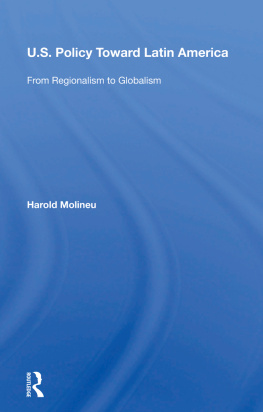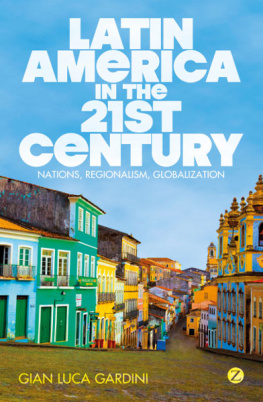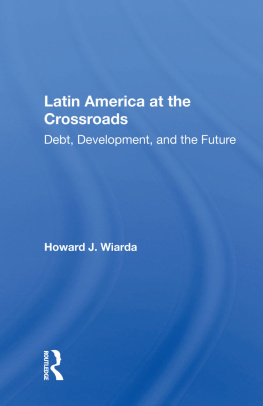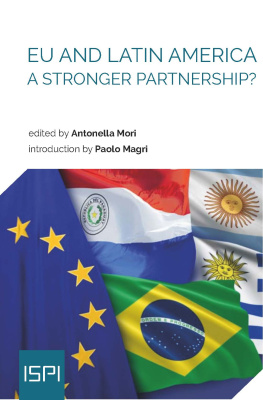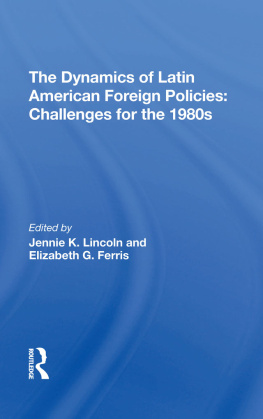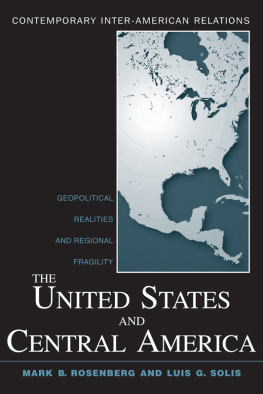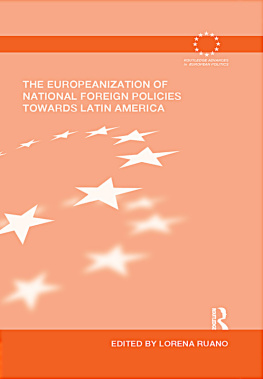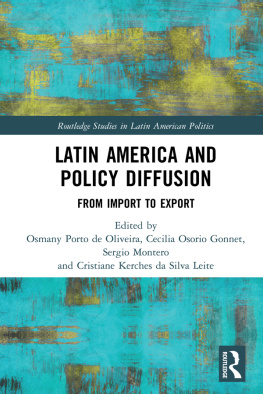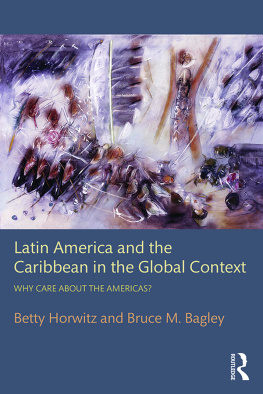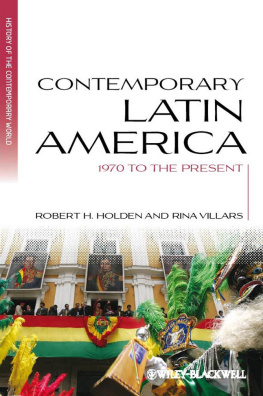U.S. POLICY TOWARD LATIN AMERICA
Also of Interest
The Caribbean Challenge: U.S. Policy in a Volatile Region, edited by H. Michael Erisman
The New Cuban Presence in the Caribbean, edited by Barry B. Levine
Revolution and Counterrevolution in Central America and the Caribbean, edited by Donald E. Schulz and Douglas H. Graham
Latin America and the U.S. National Interest: A Basis for U.S. Foreign Policy, Margaret Daly Hayes
Latin American Politics and Development , Second Edition, Revised and Updated, edited by Howard J. Wiarda and Harvey F. Kline
Latin America: Capitalist and Socialist Perspectives of Development and Underdevelopment, Ronald H. Chilcote and Joel C. Edelstein
The Fitful Republic: Economy, Society, and Politics in Argentina, Juan E. Corradi
Cuba Dilemmas of a Revolution, Juan M. del Aguila
Promise of Development: Theories of Change in Latin America , edited by Peter F. Klarn and Thomas J. Bossert
Latin American Political Economy: Financial Crisis and Political Change , edited by Jonathan Hartlyn and Samuel A. Morley
Grenada and Soviet/Cuban Policy: Internal Crisis and U.S./OECS Intervention, edited by Jiri Valenta and Herbert J. Ellison
Nicaragua: The Land of Sandino, Second Edition, Revised and Updated, Thomas W. Walker
The End and the Beginning: The Nicaraguan Revolution, Second Edition, Revised and Updated, John A. Booth
Revolution in El Salvador: Origins and Evolution, Second Edition, Revised and Updated, Tommie Sue Montgomery
Latin America , Its Problems and Its Promise: A Multidisciplinary Introduction, edited by Jan Knippers Black
The Dynamics of Latin American Foreign Policies: Challenges for the 1980s, edited by Jennie K. Lincoln and Elizabeth G. Ferris
Latin American Nations in World Politics, edited by Heraldo Muoz and Joseph S. Tulchin
Politics and Public Policy in Latin America, Steven W. Hughes and Kenneth J. Mijeski
Available in hardcover and paperback.
About the Book and Author
Recent U.S. military involvement in Central America has sparked heated debate over U.S. policy in the region. To informed observers of U.S.-Latin American relations, however, Washington's actions reflect U.S. regional and global objectives that have evolved in the course of 150 years of U.S. involvement in Latin America.
This text provides students with the necessary tools for understanding and interpreting the substance of U.S. policy toward Latin America. To analyze the shifts in policy, Dr. Molineu establishes a framework defining U.S. interests as either region-specific or global and then discusses several policy approaches that have been employed within these categories.
From a regional perspective, the author identifies Latin America as a U.S. "sphere of influence," dramatized by such cases as the Spanish-American War, dollar diplomacy, and the Bay of Pigs. He then focuses on how regional economic concerns have influenced U.S. policy, exemplified by Washington's handling of the debt crisis. In his discussions of the global perspective, Dr. Molineu addresses the region in terms of dependency theory and the North-South conflict and in terms of the ideological issues of the cold war, the latter illustrated by the cases of the Cuban missile crisis, the overthrow of the Allende government in Chile, and the Reagan administration's posture toward Nicaragua. Finally, he examines the alternative global approach that focuses on the U.S. "democratic mission" to promote democracy and human rights in the region.
U.S. Policy Toward Latin America is both descriptive and analytical, giving students the facts about key events and a framework for interpreting them. In historical context, the book covers the breadth of U.S. policy toward Latin America. Emphasis on the most visible and controversial incidents of U.S. involvement helps students grasp U.S. policy in action and provides essential background for understanding the problems facing the United States in Latin America today. This text is ideal for courses on U.S.-Latin American relations and as a supplement in courses on U.S. foreign policy and international relations.
Harold Molineu is professor of political science at Ohio University. He is the editor of Multinational Corporations in Latin America: An Annotated Bibliography (1978).
U.S. Policy Toward Latin America
From Regionalism to Globalism
Harold Molineu
To Connie, Doug, and Anne
First published 1986 by Westview Press
Published 2018 by Routledge
52 Vanderbilt Avenue, New York, NY 10017
2 Park Square, Milton Park, Abingdon, Oxon OX14 4RN
Routledge is an imprint of the Taylor & Francis Group, an informa business
Copyright 1986 by Taylor & Francis
All rights reserved. No part of this book may be reprinted or reproduced or utilised in any form or by any electronic, mechanical, or other means, now known or hereafter invented, including photocopying and recording, or in any information storage or retrieval system, without permission in writing from the publishers.
Notice:
Product or corporate names may be trademarks or registered trademarks, and are used only for identification and explanation without intent to infringe.
Library of Congress Cataloging-in-Publication Data
Molineu, Harold.
U.S. policy toward Latin America.
Bibliography: p.
Includes index.
1. Latin AmericaForeign relationsUnited States.
2. United StatesForeign relationsLatin America.
3. United StatesForeign relations20th century.
I. Title. II. Title: US policy toward Latin America.
F1418.M72 1986 327.7308 86-1344
ISBN 13: 978-0-367-21234-6 (hbk)
Contents
- PART 1
REGION-SPECIFIC APPROACHES - PART 2
GLOBAL PERSPECTIVES - PART 3
AN ALTERNATIVE PERSPECTIVE
- PART 1
REGION-SPECIFIC APPROACHES - PART 2
GLOBAL PERSPECTIVES - PART 3
AN ALTERNATIVE PERSPECTIVE
Guide
This book grew out of a concern for interpreting the contemporary problems confronting the United States in Latin America. In 1983, former Congressman James W. Symington uttered a poignant plea for Americans to address "the one consideration that has frustrated earlier efforts in dealing with Latin Americaour fundamental, dogged, appalling ignorance of the Latin mind and culture." This book cannot claim to probe all aspects of the problem, but it does seek to illuminate major elements of Latin America's experience with the United States. Such an endeavor is one step toward reducing the persistent ignorance of the region referred to by Mr. Symington.
The book is an effort to put current events into a historical context and to illustrate how the United States has shifted from a regionalist definition of its interests to a preoccupation with global interests. Key events and issues that have shaped U.S. policy are discussed within the framework of two broad perspectives: the regional and the global. In addition, a critique based on noninterventionism is presented, and some attempt is made to identify the sources of U.S. policy.
Clearly, how one defines "the problem" in Latin America has an impact on how one judges U.S. policy in the region. Because of the partisan and often emotional overtones coloring the debate over the appropriate U.S. role, it is difficult to remain neutral. However, the events discussed here are presented so that the readers might have an opportunity to judge for themselves the wisdom and success of U.S. actions.

